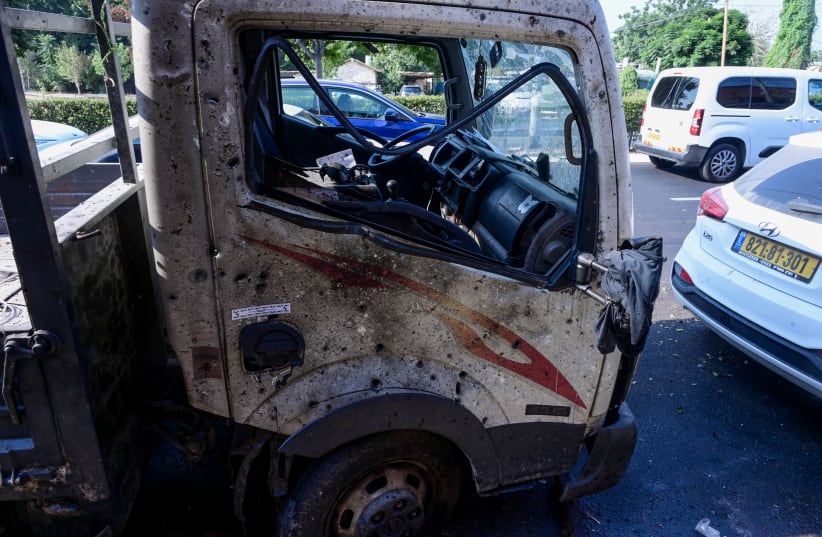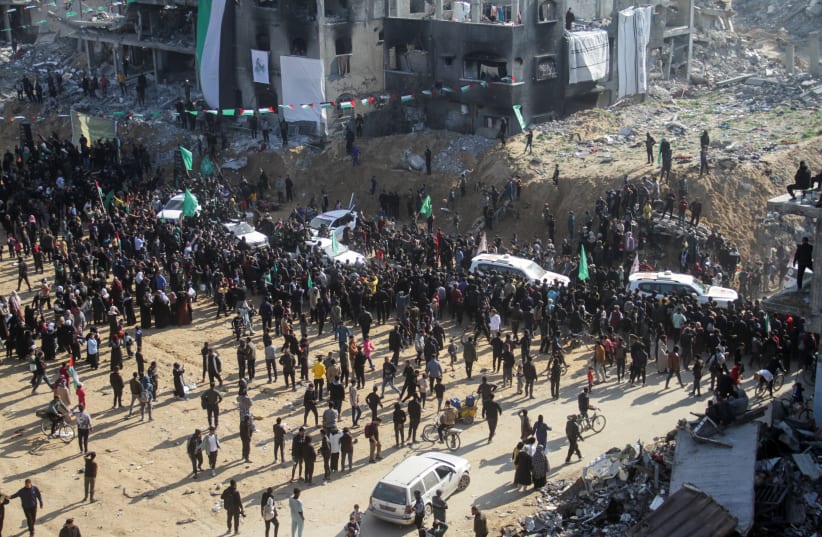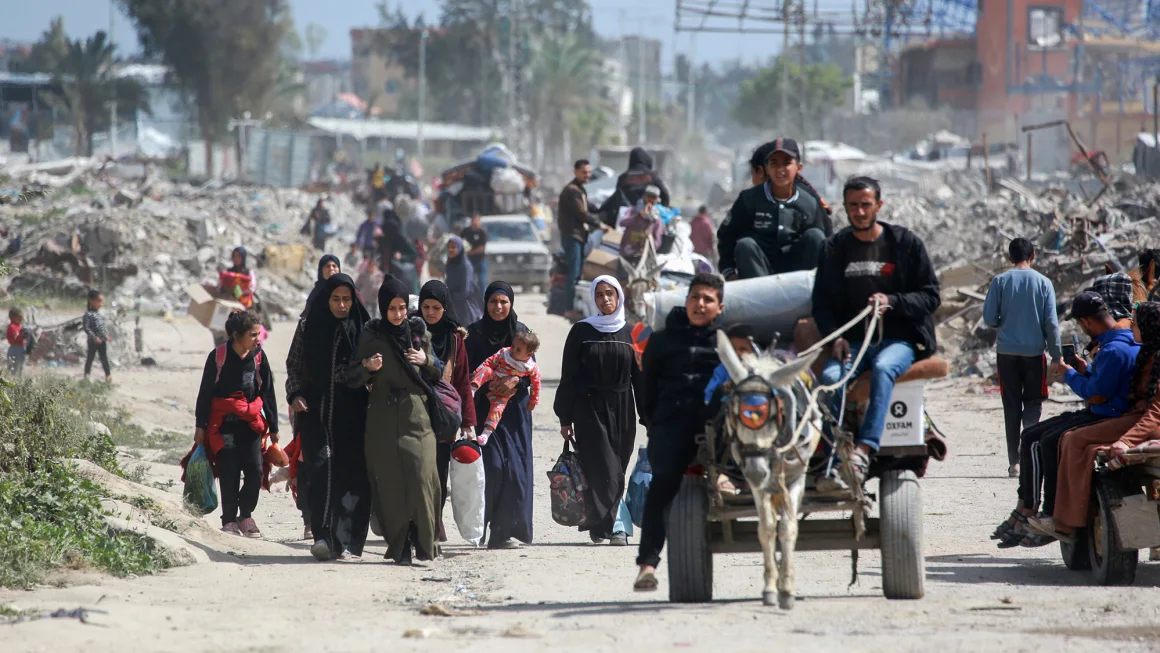Foreign
Why Hamas’s suicide bombing threats don’t lead to quaking knees – analysis

There is, however, something almost absurd about this approach. On October 7, Hamas burst into the country, committed Nazi-like atrocities, murdered, raped, pillaged, burned, and kidnapped.

Hamas and Palestinian Islamic Jihad issued a joint statement Monday claiming responsibility for the bomb that blew up in the backpack of the terrorist carrying it Sunday night in Tel Aviv and pledging suicide attacks “as long as Israel continues its massacre and policy of assassinations in Gaza.”

The purpose of the statement is clear: to instill panic and evoke haunting memories of the Second Intifada, a period when suicide attacks were a frequent and devastating reality for Israel for nearly five years.
Some in the media fell into this trap, reporting on the statement in breathless, panicky tones that conveyed a sense of impending doom, warning, “Beware, we are on the cusp of a Third Intifada.”
That, of course, is what the terrorists want: they want that panic, they want the country to quiver at the thought of a third intifada, they want the country to remember the suicide bombings of the early 2000s and fear that this is what awaits them again.
There is, however, something almost absurd about this approach. On October 7, Hamas burst into the country, committed Nazi-like atrocities, murdered, raped, pillaged, burned, and kidnapped. For the last three weeks, the country has been living under a cloud of threats from Iran and Hezbollah to spray the country with rockets and missiles and wreak a type of vengeance on Israel that the country has never experienced.
Country-wide panic?
And a statement of intent by Hamas and Palestinian Islamic Jihad is supposed to send the country into panic?
For some, this psychological warfare will have an impact. This new threat, replacing the now seemingly passé Iranian and Hezbollah threats, will come to the forefront of the news cycle and become the latest bête noire.
But what is needed is some proportion.
Hamas, in its ridiculous statement, vowed to carry out suicide attacks “as long as Israel continues its massacre and policy of assassinations in Gaza.”
As if the suicide attacks did not predate Israel’s response to the October 7 atrocity by decades—they started in the mid-1990s as an attempt to torpedo the Oslo Accords.
Efforts to carry out suicide attacks will continue as long as there are Palestinian terror organizations, and these attacks are independent of anything Israel does or does not do.
The infrequency of these attacks “succeeding” is not due to a lack of desire to carry them out, but rather a lack of capability to do so. If they could, Hamas and Palestinian Islamic Jihad would launch a suicide bombing attack against Israeli civilians twice a day.
But they can’t, and therefore, Hamas and Islamic will not be able to frighten the country with the specter of a wave of suicide bombings. It won’t work. That such a wave does not wash upon our shores is because the IDF and the Shin Bet prevent those attacks, not because the terrorist organizations are not trying to carry them out.
Suicide bombings were a feature of the Second Intifada, a feature that the 2002 Operation Defensive Shield neutralized to a large degree.
Prior to Operation Defensive Shield, Israel—in accordance with the Oslo Accords—stayed out of the large Palestinian cities. As a result, a terrorist infrastructure took shape there that turned out one suicide bombing attack after the next. Labs were built to make the explosives, workshops popped up to put the bombs on suicide vests, and a terrorist network was developed to recruit the suicide bombers, train them, and find people to ferry the murderers into Israel.
In April 2002, the IDF moved back into the Palestinian cities in the West Bank to dismantle the labs and disrupt the terrorist network. It took a couple of years, but it worked, and the suicide bombings largely disappeared. It takes a great deal of planning and preparation to carry out this type of attack, planning and preparation disrupted when the IDF went back into the cities.
Further, it has taken nearly 20 years of vigilance—of IDF soldiers going back into the cities and towns week after week, sometimes night after night, to make sure that the terrorist infrastructure does not become re-established.
In the last two to three years, there was a noticeable resurgence of terror activity inside the refugee camps in places like Jenin, Tulkarem, and Nablus, right under the IDF’s noses. Israel did not take strong enough measures to stamp them out, partly because of the same security doctrine that held sway in the country at the time and on October 7 —it did not want to ignite the area, it wanted to keep everything calm.
As the terrorism from the West Bank increased, however, this policy shifted a bit, and in July of last year — Operation Bayit VeGan— the IDF, for the first time in months, carried out a significant mission inside the Jenin refugee camp that signified a more aggressive policy.
Then October 7 hit, and even as the IDF since then has been fighting in Gaza and trading lethal blows with Hezbollah in Lebanon, it also understood that this was the time to dismantle the resurgent terrorist infrastructure in the West Bank.
According to various reports, since October 7, some 600 Palestinians have been killed in Judea and Samaria, most of them engaged in firefights with the IDF, terrorists carrying out attacks, or rioters clashing with the IDF. In addition, another estimated 4,500 people have been arrested, including more than 1,800 affiliated with Hamas.
While heavy fighting is taking place in Gaza and on the northern border, the IDF is daily also operating inside Judea and Samaria to thwart attacks that are in the planning stage and to disrupt attacks even before they are launched.
The main tool for doing this is not to wait on the roads for something to happen but rather to act on a daily basis inside various Palestinian towns and villages—to keep terrorists preoccupied with having to deal with the IDF daily so that they are unable to have the time or the freedom of movement to plan larger attacks.
These daily actions are critical in preventing attacks like the one attempted by the suicide bomber in Tel Aviv on Sunday. Understanding this is important because the media reports about Sunday’s incident suggested that only by a miracle or luck was tragedy averted. Perhaps, but in past cases — and they have been numerous — it has been the IDF and the Israel Security Agency (Shin Bet) that have prevented these suicide bombers from committing their atrocities.
All of that is worth remembering when Hamas and Palestinian Islamic Jihad warn of a new wave of suicide bombings or a Third Intifada. These groups have long yearned for this, and their inability to make it happen is not due to a lack of intent but rather because Israel’s security measures largely prevent them from succeeding — something to keep in mind when hearing the terrorist organizations’ most recent threats.

Foreign
Hamas claims spokesperson killed in Israeli strike on northern Gaza

Earlier this week, Israel killed Ismail Barhoum, a member of Hamas’ political office, and Salah al-Bardaweel, another senior leader.

Hamas spokesman Abdel Latif al-Qanou was allegedly killed in an Israeli airstrike on northern Gaza, Hamas-affiliated news agency Shehab reported on Wednesday night.

Al-Qanoa was one of Hamas’s most prominent spokesmen in Gaza, and while he avoided media appearances during the months of fighting, he gave multiple interviews to Arab news channels after the ceasefire.
Al-Qanoua was killed when his tent was targeted in Jabaliya, the Hamas-run Al-Aqsa television reported. The same strike wounded several people, medical sources said.
Earlier this week, Israel killed Ismail Barhoum, a member of Hamas’ political office, and Salah al-Bardaweel, another senior leader.
Both Bardaweel and Barhoum were members of the 20-member Hamas decision-making body, the political office, 11 of whom have been killed since the start of the war in late 2023, according to Hamas sources.
Tents for Palestinians seeking refuge are set up on the grounds of a United Nations Relief and Works Agency for Palestine Refugees (UNRWA) centre in Khan Yunis in the southern Gaza Strip on October 19, 2023, amid the ongoing battles between Israel and the Palestinian group Hamas (credit: MAHMUD HAMS/AFP via Getty Images)
The IDF has yet to comment on the alleged elimination.
Increased IDF pressure in the Gaza Strip
Since fighting in Gaza was renewed at the beginning of last week, the IDF has killed 150 terrorists, including 10 top Hamas officials, The Jerusalem Post learned Tuesday.
In certain areas, the military has entered a full kilometer into Gaza, such as around the Nitzanim Corridor in central Gaza.
In addition to central Gaza, Beit Lahia, Beit Hanoun, parts of Khan Yunis, Shaboura, and Tel Sultan, the IDF has been evacuating and moving into Jabaliya.

Foreign
Dead Nigerians, Africans, others without will may lose unclaimed estates in UK

Hundreds of unclaimed estates reveal untold stories of African migration, wealth, and family ties left behind.
Thousands of people die every year in the United Kingdom without leaving a will or identifying next of kin, and among them are many Nigerians and other Africans whose estates—ranging from property to savings—remain unclaimed.
The UK government’s latest list of unclaimed estates, updated daily, includes over 170 entries connected to African-born individuals, with Nigerians making up a significant portion of the cases.

A Legacy Lost
For many migrants, the UK became a home away from home—a land of opportunity where they built wealth, purchased property, and created a life.

However, the absence of a will often results in their assets being classified as “bona vacantia” (ownerless goods), leaving them to the custody of the Crown.
Families back in Africa are frequently unaware of these estates, leading to a permanent loss of assets.
Cases like that of Adenike Adebiyi, who passed away in Hackney, London, in 2004, or Solomon Adekanmibi, who died in Colchester, Essex, in 2021, highlight the consequences of dying intestate.
With no identified next of kin or missing documentation, their estates remain unclaimed, and their legacies risk being forgotten.
Why It Matters
This phenomenon underscores a critical issue: many African families are unaware of their relatives’ financial situations abroad.
Migration often disrupts communication, and without clear documentation, the wealth built overseas remains beyond reach.
The loss isn’t just financial—it’s deeply cultural and emotional. Unclaimed estates represent untold family histories, connections, and the struggles of migrants who built their lives in the diaspora.
The Challenges
Lack of Awareness:
Most families in Nigeria and other African countries are unaware of their relatives’ estates abroad or how to access them.
Genealogical Gaps:
The information provided in official records is often incomplete. For example, many entries in the UK unclaimed estates list lack detailed family history or next-of-kin information.
Cultural Hesitations:
In many African cultures, discussing death and wills is considered taboo, leading to reluctance in planning for asset distribution.
A Call to Action
African governments, community organizations, and legal professionals need to raise awareness about this issue.
Here’s what can be done:
Encouraging Will Writing: Migrants in the diaspora should be educated about the importance of drafting wills to protect their assets.
Genealogical Support: Families in Africa can be assisted in tracing unclaimed estates through local or international partnerships.
Public Awareness Campaigns: Social and traditional media can highlight the importance of estate planning and share resources for families.
How to Check the List
The UK government maintains a public Unclaimed Estates List that is updated daily.
Families can search the list by name, place of birth, or other identifiers to check for potential claims.
Final Thoughts
For many Nigerians and Africans in the UK, their unclaimed estates represent more than just wealth—it’s a story of migration, resilience, and identity.
By addressing this growing issue, families can reclaim their heritage, and the legacy of those who journeyed to the diaspora need not be forgotten.
Here is the latest daily update as of March 24, 2025. Check the list

Foreign
Israel approves controversial proposal to facilitate emigration of Palestinians from Gaza

Israel’s security cabinet has approved a controversial proposal to facilitate Palestinian emigration from Gaza, a move critics warn could amount to ethnic cleansing.

Israeli Finance Minister Bezalel Smotrich on Sunday said the security cabinet approved the proposal by Defense Minister Israel Katz to organize “a voluntary transfer for Gaza residents who express interest in moving to third countries, in accordance with Israeli and international law, and following the vision of US President Donald Trump.”

The decision marks a remarkable endorsement of a plan once considered a far-right fantasy – and comes despite the prime minister’s earlier pledge not to permanently displace Gaza’s civilian population.
Critics have said that any mass displacement of Gazans in the midst of a devastating war would amount to ethnic cleansing, an act associated with war crimes and crimes against humanity under international law. Israeli officials have countered that emigration would be voluntary and in line with international legal standards.
But aid groups argue that Israel’s war has made life in Gaza nearly impossible. Martin Griffiths, the United Nations’ top emergency relief official, has called the enclave “uninhabitable,” saying its people are “witnessing daily threats to their very existence.”
The Israeli approval would establish an administration within the defense ministry “to prepare and facilitate the safe and controlled movement of Gaza residents who wish to voluntarily move to third countries,” according to a statement from the defense ministry.
Its work would include “establishing movement routes, pedestrian checks at designated crossings in the Gaza Strip,” and infrastructure to enable people to leave.
Israeli officials have presented the plan as a fulfillment of a desire by Trump to take over Gaza, expel its Palestinian population to neighboring countries and turn it into a Middle Eastern “riviera.”
The Palestinian Authority’s Minister of State for Foreign Affairs Varsen Aghabekian Shaheen told CNN’s Becky Anderson last month that Palestinians “are steadfast to stay in their land and will not move.”
Trump’s ‘vision’
Katz said Sunday that Israel is using “all means to implement the vision of the US president,” according to the defense ministry statement.
This month, Trump appeared to backtrack on his comments about displacing Palestinians, telling reporters that “nobody is expelling any Palestinians.” Steve Witkoff, the US special envoy to the Middle East, said last month that the US initiative to rebuild Gaza won’t necessarily amount to an “eviction plan” and that it was designed to “shake up everybody’s thinking.”
Last year, Israeli Prime Minister Benjamin Netanyahu said his country had no intention to displace Palestinians or occupy Gaza.
Related articleTrump says ‘nobody is expelling Palestinians,’ weeks after saying they should be moved to Arab states
“I want to make a few points absolutely clear: Israel has no intention of permanently occupying Gaza or displacing its civilian population,” Netanyahu said in a video statement in January 2024.
Trump’s proposal has, however, brought the idea further into the mainstream, with Israeli politicians now openly discussing mass emigration of Gazans as a solution to the war. And Katz last week said that Israel may maintain a permanent presence in the enclave.
Israeli rights group Peace Now criticized the plan, saying “the establishment of the administration to expel Palestinians from Gaza is one of the stupidest moves by a government that has lost all direction and logical thinking.”
The prospect has also drawn sharp rebuke from Arab leaders, especially Egypt and Jordan, who would be expected to absorb the large number of expelled Palestinians. Experts have also warned that displacing Palestinians would further destabilize the region and threaten the security of neighboring states.
Smotrich said Sunday that the security cabinet also approved the expansion of Jewish settlements in the occupied West Bank, noting that 13 areas in the West Bank would be split from existing settlements and would be recognized as independent settlements.
“Instead of hiding and apologizing – we are raising the flag, building, and settling. This is another important step on the path to actual sovereignty in Judea and Samaria,” he said, using the name by which Israelis refer to the West Bank.
The Yesha Council, an umbrella body representing Jewish settlements, said that as of January 2024, there were 150 settlements in the West Bank.
It said that the decision exposes a “long-standing lie that (Israel) does not establish new settlements, but only ‘neighborhoods’ of existing settlements” and that it is “another nail in the coffin that the Government of Israel is preparing for the only chance for a future of peace and security.”
A statement sent by Smotrich’s office said the move comes against “the backdrop of the approval of tens of thousands of housing units in Judea and Samaria and represents another significant step in the process of normalizing and regulating the settlement.”
Smotrich and other right-wing ministers have been pushing an aggressive expansion of settlements on the path to declaring Israeli sovereignty over the West Bank, which would be in defiance of international law and UN Security Council resolutions.
Israel says it will maintain ‘permanent’ presence in Gaza unless hostages are freed

-

 Foreign1 week ago
Foreign1 week agoHouthis declare Ben-Gurion Airport ‘no longer safe’ after renewed Gaza fighting
-

 Security2 days ago
Security2 days agoNew Commissioner of Police in Niger, Elleman sends strong warning to criminals
-

 News2 days ago
News2 days agoKogi Governor, Ahmed Usman Ododo salutes Tinubu at 74
-

 News1 week ago
News1 week agoUmeh denies receiving $10,000 with other 42 Senators to support state of emergency in Rivers
-

 News1 day ago
News1 day agoAbia: LG Chairman, Iheke accused of using soldiers to detain IRS agent, claims Governor Otti’s support
-

 News2 days ago
News2 days agoPlateau LP stakeholders endorses Barr Gyang Zi’s defection to APC
-

 Sports1 week ago
Sports1 week ago2026 World Cup Race: Ekong says Eagles feel great to be back in contention
-

 News2 days ago
News2 days agoAkpabio pays historic visit to office of SA to President on Senate Matters






















